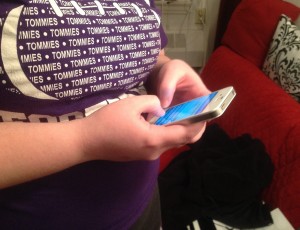Sleepwalking or eating are two things some sleepers do without knowing, but according to a recent article, a new habit has made the list: sleeptexting.
A new phenomenon, dubbed “sleeptexting,” has started affecting habitual texters, especially young people, who text almost automatically, according to a CNN article.
“(Sleeptexting) is a parasomnia, which is a behavior that occurs with sleep that’s not supposed to,” Roxanne Prichard, associate psychology professor, said. “It’s sort of like sleepwalking or sleeptalking or grinding your teeth or even sleepeating.”
Sophomore Jesse Stone said he has texted in his sleep, and that his phone habits affect the quality and quantity of his sleep.

“I was lying in bed, and I was kind of dozing in and out waiting for the phone to ring,” Stone said. “I’d kind of hear something, and I’d text them something in response and just go right back to sleep. It was like a quick moment where I’d be half awake and still kind of groggy.”
Stone said when he sends texts in his sleep they tend to be spelled wrong and the spacing “isn’t the best.”
Sleeptexting is so new that research has yet to produce studies regarding its effects on sleep, but Prichard said the phenomenon does affect snoozing habits.
“It is disrupting your sleep because it’s partial wakefulness,” Prichard said. “Part of your brain, sort of the autopilot, is awake enough to do things, which means that your brain isn’t getting full rest.”
Stone said he agrees and his habit of keeping his phone on so he can hear it during the night is disruptive. He keeps it on vibrate just in case something important happens.
Freshman Jessica Mechtenberg said she experiences sleeptexting about once a month, and usually ends up sending messages to people she doesn’t normally text with.
“I’m just tired, didn’t get as great of sleep as I would have liked to,” Mechtenberg said.
Senior Carly Boehm does not text in her sleep because she keeps her phone away from her bed.
“I’m a really light sleeper. If I get a text, it’s just going to wake me up. I’m conscious of myself sending a text,” Boehm said. “Most people also know that I have a tendency to go to bed early so they just don’t (text me).”
Boehm said sleeptexting can be a sign of other underlying sleep problems.
“I think if (people are) texting in their sleep, and they’re unconscious of it, then they probably have other sleep issues,” Boehm said. “I would imagine texting is more of a symptom of it than it is the cause.”
Prichard said that if students want to stop sleeptexting, they should distance themselves from their phones at night.
“Turn off the phone and put it farther away from the bed,” Prichard said. “Just turn the phone completely off, or set it on airplane mode, or put it far away from you so you can’t grab it while you’re sleeping.”
Grace Pastoor can be reached at past6138@stthomas.edu.

